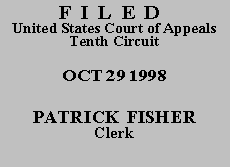

| LINDA L. MARTIN,
Plaintiff-Appellant, v. KENNETH S. APFEL, Commissioner of Social Security Administration, Defendant-Appellee. |
|
Plaintiff appeals the district court's decision upholding the Commissioner's denial of supplemental security income. Plaintiff alleged that she was disabled due to depression and other mental health problems. The administrative law judge (ALJ) found, at the fifth step of the applicable analysis, see 20 C.F.R. § 416.920, that plaintiff was not disabled because she retained the ability to perform some work existing in the national economy. The Appeals Council denied review, making the ALJ's determination the Commissioner's final decision.
This court reviews the Commissioner's decision to determine only whether he applied the law correctly and whether the record contains substantial evidence to support the decision. See Bean v. Chater, 77 F.3d 1210, 1213 (10th Cir. 1995). At step five, the burden is on the Commissioner to establish that plaintiff is capable of performing work existing in the national economy. See Daniels v. Apfel, 154 F.3d 1129, 1132 (10th Cir. 1998).
On appeal, plaintiff argues that the ALJ erred in rejecting the opinion of plaintiff's treating physicians, applied incorrect legal standards, and erred in determining that plaintiff was not disabled, and that the record does not contain substantial evidence to support the Commissioner's denial of benefits. Upon consideration of the record and the parties' briefs, we affirm.
Two of plaintiff's treating physicians did indicate that plaintiff was disabled because she met the listing of impairments for affective disorders, see 20 C.F.R. Pt. 404, Subpt. P, App. 1, § 12.04, and one of these treating physicians also indicated that plaintiff met the listing for anxiety-related disorders, see id. § 12.06. A treating physician's opinion that a claimant is disabled, however, is not dispositive. See Castellano v. Secretary of Health & Human Servs., 26 F.3d 1027, 1029 (10th Cir. 1994). Nonetheless, an ALJ is required to give controlling weight to a treating physician's well-supported opinion, so long as it is not inconsistent with other substantial evidence in the record. See 20 C.F.R. § 416.927(d)(2); see also Bean, 77 F.3d at 1214. In this case, however, the opinion of plaintiff's two treating physicians that plaintiff met the listings is contrary to their own treatment notes and is inconsistent with other substantial evidence in the record. See Castellano, 26 F.3d at 1029. The ALJ, therefore, did not err in rejecting those opinions.
Further, to the extent that the various "Psychiatric Review Technique" forms and the mental residual functional capacity assessment forms in the record conflict as to their determination of the limitations plaintiff's mental impairments impose on her ability to function, it was within the ALJ's province to determine the appropriate weight to be given this contradictory evidence. See Casias v. Secretary of Health & Human Servs., 933 F.2d 799, 801 (10th Cir. 1991). Lastly, because the hypothetical questions posed to the vocational expert (VE) included the limitations supported by the record, the ALJ did not err in determining that plaintiff possessed the ability to perform work existing in the national economy. See Decker v. Chater, 86 F.3d 953, 955 (10th Cir. 1996).
The judgment is AFFIRMED.
Entered for the Court
Circuit Judge
*. This order and judgment is not binding precedent, except under the doctrines of law of the case, res judicata, and collateral estoppel. The court generally disfavors the citation of orders and judgments; nevertheless, an order and judgment may be cited under the terms and conditions of 10th Cir. R. 36.3.